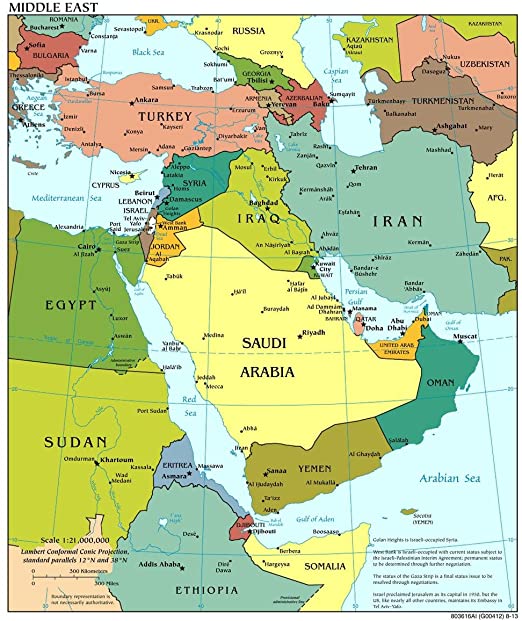The UAE signed the Abraham Accords in September 2020 with the declared aim of promoting peace and stability in the region. The accords’ scope extended beyond bilateral relations with Israel, as they were supposed to set a “strategic agenda for the Middle East.” However, following the recent Israeli-Palestinian violence, the accords received a lot of criticism, including in the American media. They were accused of making “things worse in the Middle East,” even by pro-Israeli writers. The futility of then-US President Donald Trump’s claim that they would “serve as the foundation for a comprehensive peace across the entire region” is being debated.
The UAE has, however, been trying to play a role through the accords. Following the ceasefire that was brokered by Egypt and Qatar last month, Sheikh Mohammed bin Zayed Al-Nahyan declared that his country was ready to play a role in advancing peace. The Abu Dhabi crown prince also visited Jordan’s King Abdullah to discuss the ceasefire and plans to rebuild Gaza.
The UAE does not have much leverage on the Palestinian side. It is a fierce enemy of Hamas and its relations with the Palestinian Authority can at best be described as cold. However, it has a window to build better ties with the Palestinians by influencing the Israeli public. This would also carve out a role for the UAE in regional mediation.
Israel’s government policy toward the conflict could change if public opinion changes. Israeli society is as polarized as ever. While the far right is openly advocating annexation, the center realizes what such a move would mean for the future of the state. This polarization is reflected in the four general elections that have been held over the past two years, with Israeli society unable to build a consensus on what it wants. The UAE could launch a grassroots campaign to influence how people in Israel think. This task could be helped by the fact Israeli Prime Minister Benjamin Netanyahu might be on his way out. He has failed to form a government and his exit could spell the end of his political career, particularly if he is convicted of fraud in his ongoing trial. With Netanyahu, who is the main obstacle to the two-state solution, gone, there could be space for the UAE to conduct a public relations program with the Israeli grassroots.
The UAE can benefit from the fact it has a diplomatic mission in Israel, which gives it the chance to engage with the grassroots. It could send Emirati students, academics, professionals and businessmen and mandate them to connect with their counterparts in Israel. They would have to connect with civil society organizations, trade unions, professional associations, religious organizations and charities, promoting the idea of ending the occupation and achieving the two-state solution.
Such an outreach plan would not require a large budget. The UAE only needs to identify about 200 of its own citizens who have an interest in public affairs, are good speakers, and are fluent in English. It needs to train them on the proper messaging that could convince an Israeli citizen. The messaging should not be crafted from the Palestinian angle but from the Israeli angle. It should focus on the fact that an independent and viable Palestinian state with East Jerusalem as its capital is the only guarantee for an Israeli state and that annexation would dilute the Jewish component of the state of Israel. It is also important to discuss the issue of Al-Aqsa Mosque. The founder of Israel, David Ben-Gurion, never wanted to deal with Al-Aqsa. He knew that handling a sacred Muslim religious site would be a gargantuan task. Even after the occupation of East Jerusalem in 1967, Defense Minister Moshe Dayan did not want to get involved in such a highly problematic issue.
The rollout of the plan would also not be complicated. The UAE Embassy in Israel can get the contacts of the various institutions and organizations, prepare meetings and organize events in which the Emirati emissaries can interact with their Israeli counterparts. The program can be rolled out quite quickly, as Israel is a small country of about 9 million people. Following the recent clashes, which were not confined to Hamas and the Israeli military but also included Jerusalem and the Palestinian citizens of Israel, ordinary Israelis are asking themselves some difficult questions. This makes it a good time to approach them.
In addition to discussing the future and character of the state of Israel, it is important to highlight the benefits of peace with the region and the negative effect of the absence of a fair settlement with the Palestinians on the global perception of Israel. The latest round of clashes generated a lot of negative publicity for Tel Aviv and international public opinion is shifting. It will likely get worse for Israel with every round of clashes. Hence, it is in its own interests to reach a solution as quickly as possible, as the status quo is no longer sustainable.
This plan also falls in line with the UAE’s policy of seeking to be a regional leader in soft power, in which it mentions “people diplomacy” as one of the six main pillars of its strategy.
*Dr. Dania Koleilat Khatib is a specialist in US-Arab relations with a focus on lobbying. She is co-founder of the Research Center for Cooperation and Peace Building, a Lebanese NGO focused on Track II. She is also an affiliate scholar with the Issam Fares Institute for Public Policy and International Affairs at the American University of Beirut.
June 2, 2021
The viewpoints expressed by the authors do not necessarily reflect the opinions, viewpoints and editorial policies of Aequitas Review.


